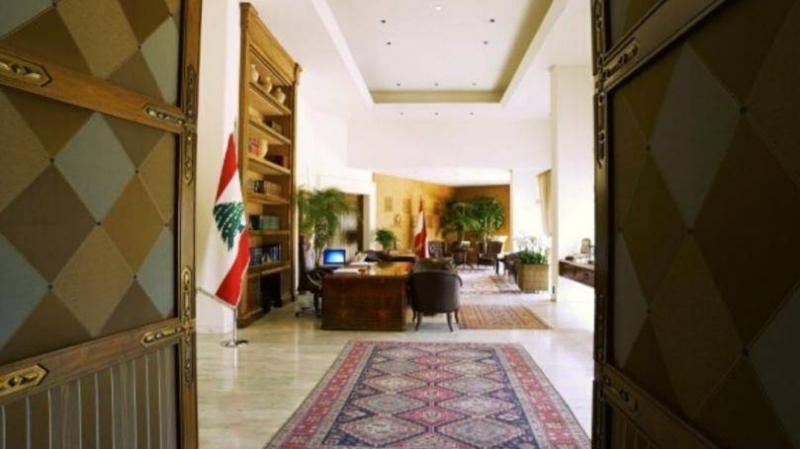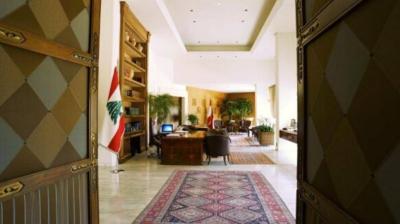The most alarming aspect we witness daily is the "absolute surrender" to the anticipated presidential vacancy. All indicators suggest that the language of dialogue among parliamentary blocs in the House of Representatives will not lead to the announced understanding regarding the forthcoming president. Each of those who consider themselves entrusted with the "national duty" of electing the new president are well aware that each one has their own platform and candidate, to such an extent that political, parliamentary, and even ethical balances have been lost in affirming respect for what the constitution dictates when it stipulated the time frame for electing a successor to prevent any disruption within constitutional authorities in the country and to organize relations between them for the state's machinery to function whenever it exists.
Based on this equation, political and diplomatic sources speaking to "Al-Markazia" agree on the aforementioned description and the negative equation existing on multiple levels. This is not only based on the parliamentary structure but also on the political level. The severe division among Lebanese citizens on major strategic issues is exacerbated by the fact that the House of Representatives lacks the "absolute majority" necessary for electing the new president. Even if this majority were to materialize at some potential junctures, it lacks the "two-thirds majority," which is crucial for the upcoming electoral process and cannot be overlooked for any date on which the new president might arise. Without any constitutional, political, or legal debate, this majority forms the necessary condition to hold any session for electing a president with the full constitutional and legal specifications that govern it, especially given that it is governed by a series of difficult and complicated presidential criteria that do not bode well for the emergence of the required candidate to prevent the "fatal" vacancy amid the political, constitutional, economic, and social conditions the country is experiencing, along with the entrenched disputes regarding mechanisms to navigate its complexities.
Upon delving into the details, a diplomatic source, considered one of the keenest observers and participants in the presidential entitlement, believes that their discussions with officials have reinforced their conviction regarding overlapping dual admissions that address the negative equation present in the legislative authority, which is the supreme authority and the source of legitimacy for the other two powers. The situation has reached a point where the roles of the failed and the incapacitated, unable to initiate any undertaking that could break the deadlock caused by "severe divisions," are now equal with those who are resigned to a code word emerging from abroad, alongside those who mistakenly believe they have become the "swing vote" in the upcoming entitlement as a result of the recent parliamentary elections and the hybrid alliances that accompanied them.
Thus, we simply face a strange and bizarre configuration incapable of devising solutions and exits, no matter how visible and assessed by all the established balances. In light of this "complex mosaic," the country appears on the brink of a presidential vacancy without the guarantees needed to navigate this phase that could lead to consideration as an extremely short experimental period that must be traversed according to new rules and equations, potentially leading to a restoration of political life in the country. The diplomatic source adds that after the end of the presidential term, matters will change in more than one way compared to the current situation for various reasons. The tendencies witnessed during this term at the level of governance and government have led to isolating the country from its external surroundings and placing the small nation on the "road of elephants," resulting in the state's collapse and its institutions, with only the minimal assurance of security and political existence remaining, which cannot be repaired if it falls entirely. This is an equation that reflects the magnitude of the multifaceted crises with no one available to rearrange their priorities.
On this basis, the source continues to state that the Lebanese should prepare to discuss a new list of specifications for the upcoming president within a broader basket arranged for the country and the region. The international and regional implications of the demarcation agreement, combined with a host of other crises related to irregular migration and the aftermath of the Syrian refugee crisis coupled with the monetary and financial situation, necessitate a different approach that is incompatible with the current pillars of governance in Lebanon. It is imperative to find another formula that does not affect the political system in Lebanon and its fragile demographic structure, a matter that is now simmering without reaching the stage of holding a "founding conference" similar to past experiences. The country cannot withstand such a significant change brought about by the "Taif Agreement," which resulted in a new constitution for the country, but it needs something akin to a "mini Doha," for instance.
As a result, the diplomatic source concludes by stating that the experience that led to the "October 11 Agreement" or "October 11 Truce," regardless of the designation given to what transpired in the maritime borders between Lebanon and Israel, can be politically translated in Lebanon through multiple scenarios that relate to the presidential vacancy stage. However, the problem is that some of the current candidates believe their odds will increase in the upcoming phase, placing themselves at the forefront of the race to the Baabda Palace under "illusions and personal concerns," while the prevailing belief is that those who faltered in the first constitutional deadline cannot be present in subsequent ones. The scenarios that address the phase impose a new mechanism for dealing with the specifications of the future president, their identity, personality, and qualifications, as the projects proposed behind the scenes have reached an advanced stage. They require some time to come to light after considering the economic, financial, humanitarian circumstances, and Lebanon's relations with its Arab and international counterparts in their appropriate form, and tomorrow will reveal it to those who await it.




